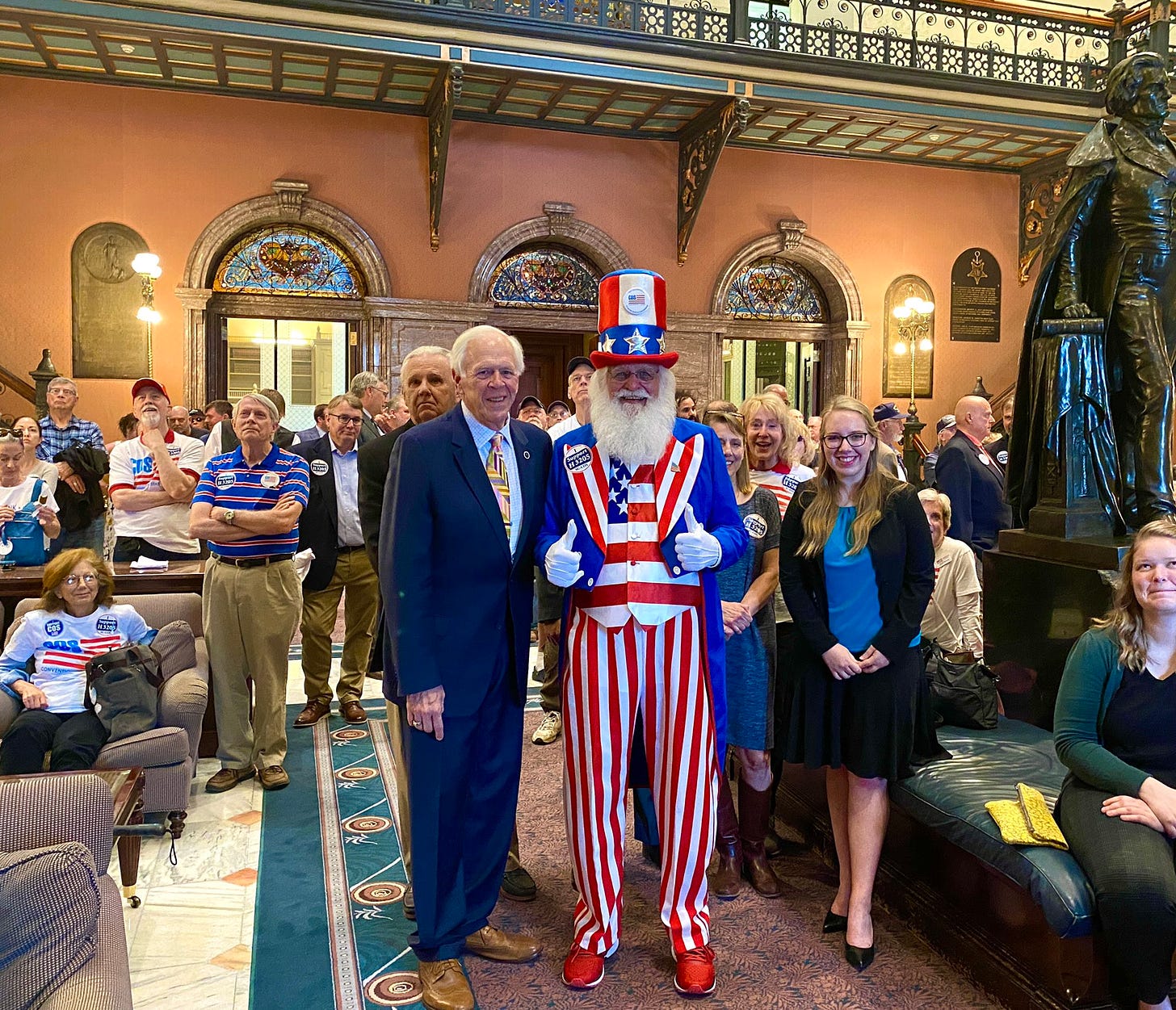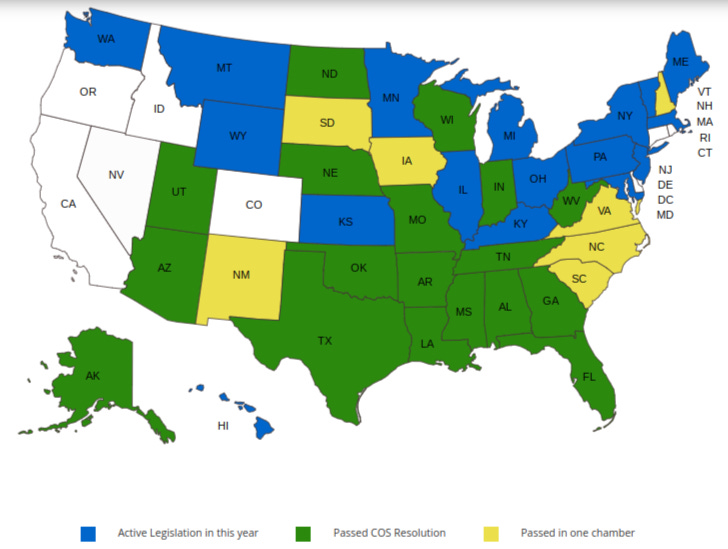A convention of dunces
Checking in on the billionaires’ crusade to screw with the U.S. Constitution

A clutch of billionaires, lobbyists, and right-wing lawmakers marked a quiet milestone in January. With the passage of a resolution, Nebraska’s state legislature became the 17th in the country to call for a “convention of states” to amend the U.S. Constitution.
One way to amend the constitution in this country is for two-thirds of the state legislatures — so, 34 — to apply for “a convention for proposing amendments.” When Nebraska passed its resolution, we as a country arrived at the halfway point. West Virginia became the 18th state legislature to pass a Convention of States resolution on March 3, and more states are likely to follow suit this year.
What amendments, specifically, would the backers of this convention want? The Republican lawmakers copying and pasting “Convention of States” bills into their dockets tend to talk in general terms about reducing federal spending and decreasing the power of the federal government. They got a lot more specific with their wishlists at a mock convention of states held in September 2016 in colonial Williamsburg, Va.
These were some of the proposals that received hours of debate from delegates on the convention floor:
A repeal of the 16th Amendment, effectively abolishing the federal income tax
An amendment stating that Congress has no power “to regulate or prohibit any activity that is confined within a single state regardless of its effects outside the state”
An amendment allowing states to vacate U.S. Supreme Court rulings by a vote of three-fifths of the state legislatures
An amendment allowing states to abrogate any federal law or regulation with a three-fifths majority
A “fiscal restraints” amendment that would require a two-thirds vote in each house of Congress every year to raise the federal debt
According to Brendan O’Connor’s reporting in Fusion, 1 Mark Meckler, president of Citizens for Self Governance, gave the crowd a call to action: “This is our moment. I’m asking you to stand up, to live your heritage, to live your birthright — to be who you were born to be.”
Unless you follow trends in state-level politics or enjoy loitering in Statehouse lobbies, you might not be familiar with conservatives’ decade-long push to amend the U.S. Constitution. Ominously enough, many of the Convention of States resolutions since the movement started circa 2011 have been passed by Republican-controlled legislatures in former Confederate states, the perennial dens of nullification and interposition. The next state to join the movement might be South Carolina, where the Republican-controlled Senate voted March 9 to approve a Convention of States resolution, House Bill 3205.
Rep. Bill Taylor (R-Aiken) has been leading the charge to pass a Convention of States resolution here in South Carolina since he first introduced a resolution in 2013. In a March 13 newsletter to constituents titled “REBELLION!” he ranted about the agenda of “avowed Socialists” in Congress and the lies of the “Lame-Brain-National-Media-Propaganda-Machine.”
“If people are feeling rebellious toward the federal government, having a Convention of States is the only way to rebel lawfully,” Taylor wrote.
The Houston-based Convention of States Project describes itself on its website as “first and foremost a movement of grassroots citizens who are fed up with business as usual in Washington D.C.,” which is the sort of description you might reasonably believe if you underwent an ice-pick lobotomy during the Obama administration.
In fact, the Convention of States Project (a.k.a. Convention of States Action, formerly known as John Hancock Committee of the States, founded by Citizens for Self Governance) is a 501(c)(4) nonprofit organization funded largely by high-dollar donors including some of the same billionaires who bankrolled the Tea Party. A 2019 financial report on Convention of States Action found that just two donors accounted for $2.5 million, or 36% of all contributions to the organization that year. Previous reporting from 2017 indicated that major contributors included hedge fund billionaire Robert Mercer’s private family foundation 2 and a web of donor-advised funds associated with the fossil-fuel heirs Charles and David Koch.
Through organizations like Americans for Prosperity and the Club for Growth, the Kochs and Mercers wield godlike power over state and national politics. The mere threat of a Club for Growth-backed primary challenge is often enough to whip Republican votes when it comes to austerity measures and tax cuts for the ultra-wealthy.

The Convention of States Project’s public-facing leaders include fading stars of the Tea Party movement, which fostered a white reactionary backlash to the election of the first Black president in 2008. Convention of States Action President Mark Meckler previously co-founded the Tea Party Patriots in 2009 but resigned from the organization in 2012 after he tried to bring a Glock semi-automatic handgun onto an airplane at LaGuardia Airport. He also served as interim president of the conservative social media app Parler and is associated with the Christian hard-right Council for National Policy and the conservative bill mill ALEC, according to SourceWatch.
Former Sen. Jim DeMint of South Carolina, another Tea Party darling, did a stint as president of the Heritage Foundation before becoming a senior advisor to the Convention of States Project in 2017. Other luminaries serving in leadership roles include the anti-gay extremist former Sen. Rick Santorum. COVID-19 denialist Dr. Jeffrey Barke, the Convention of States “Chief Medical Advisor,” is perhaps best known for brandishing a gun while filming an anti-mask video in September 2020.
It remains to be seen whether the Mercers, Kochs, and Mecklers of the world can get another 16 state legislatures on board with their agenda. Even if they make it to a convention, Article V of the Constitution requires a three-fourths majority of the states to approve any amendments.
Some in the conservative movement, including right-wing operative Will Folks of South Carolina, have been fretting that Congress might not even recognize a call for a Convention of States if the various state resolutions are not identically worded. Depending on the composition of Congress and the state delegations when such a convention takes place, the plan could backfire by allowing a raft of progressive amendments rivaling those of Reconstruction. Funnier twists have happened.
The Convention of States idea remains a long shot for conservatives at the federal level, but its success so far in state legislatures — and the hundreds of hours of hearings consumed by debate about it — highlights the distorting influence of oligarchic power in U.S. politics. The Convention of States has no groundswell of popular organizing behind it, just a pile of cash and an obsessive cadre of conservative politicians.
In states where Republicans hold a trifecta of power over the House, Senate, and governor’s mansion, Democrats have a tendency to get sarcastic about bills like these. During Senate debate this month, South Carolina Sen. Marlon Kimpson (D-Charleston) tried to throw a wrench into the Convention of States bill by proposing an amendment that would fund reparations for the descendants of enslaved African people.
Last year during House debate about the same bill, Rep. John King (D-York) proposed that the state of South Carolina should decline all federal funding “since we believe that the federal government spending is out of control.” Speaking to the full House on May 11, 2021, King tried to shame his colleagues for frittering away days of debate on a Convention of States bill while a pandemic, a teacher staffing crisis, and the ongoing collapse of state infrastructure carried on unabated outside their chamber.
“If you love this state,” King said, “you ought to be ashamed as to what we are doing up here.”

***
Brutal South is a free weekly newsletter about class struggle, education, and religion in the American South. If you would like to support my work and get access to the complete archives, paid subscriptions are $5/month.
Bookshop // Twitter // Bandcamp // Apple Podcasts // Spotify Podcasts
Brendan’s piece, “Right-Wing Billionaires Are Buying Themselves a New Constitution” (archived here), remains one of the strongest pieces of reporting I’ve seen on the Convention of States movement. RIP Fusion!
Every time I read about Robert Mercer, I’m reminded of how Jane Mayer described him in her book Dark Money, in a section on the financiers who attended Koch donor summits during the early days of the 2008 recession:
“The hedge fund run by another of the Kochs’ major investors, Robert Mercer, an eccentric computer scientist who made a fortune using sophisticated mathematical algorithms to trade stocks, also seemed a possible government target. Democrats in Congress were considering imposing a tax on stock trading, which the firm he co-chaired, Renaissance Technologies, did in massive quantities. Although those familiar with his thinking maintained his political activism was separate from his pecuniary interests, Mercer had additional business reasons to be antigovernment. The IRS was investigating whether his firm improperly avoided paying billions of dollars in taxes, a charge the firm denied. Employment laws, too, would prove an embarrassing headache for him; three domestic servants soon sued him for refusing to pay overtime and maintained that he had docked their wages unfairly for infractions such as failing to replace shampoo bottles from his bathrooms when they were less than one-third full. The tabloid news stories about the case invariably mentioned that Mercer had previously brought a suit of his own, suing a toy-train manufacturer for overbilling him by $2 million for an elaborate electric train set he had installed in his Long Island, New York, mansion. With a pay package of $125 million in 2011, Mercer was ranked by Forbes as the sixteenth-highest-paid hedge fund manager that year.”




Thank you for your reporting on this. First time I've heard about this particular power grab.
Paul, you are so brilliant and spot on - love the play of words on your title - confederacy of dunces - brilliant book - author died too soon